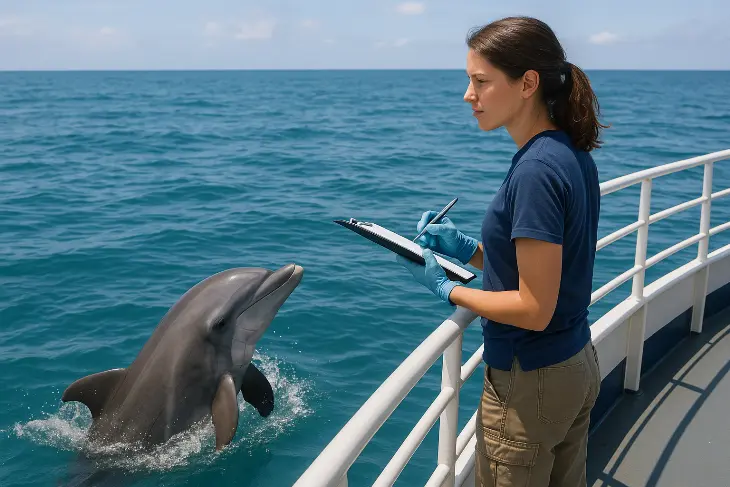Marine Biology is a dynamic field dedicated to understanding the vast and varied life forms that inhabit the oceans.
From microscopic plankton to the largest whales, marine biologists study the behavior, genetics, physiology, and ecological interactions of marine species.
If you’re passionate about the ocean and its inhabitants, a career in marine biology can offer an exciting and fulfilling path.
Also Read
Here’s a detailed guide to the various career opportunities and growth potential in this specialized field.
What Does a Marine Biologist Do?
Marine biologists conduct research to expand our knowledge of marine life and the ecosystems they inhabit. This includes:
- Fieldwork: Collecting samples and data from the ocean or coastal areas.
- Laboratory Analysis: Studying collected samples to analyze the physical and chemical properties that affect marine life.
- Conservation Efforts: Working on projects aimed at protecting marine species and their habitats.
- Public Education: Teaching communities about the importance of marine conservation.
Career Opportunities in Marine Biology
Marine biology offers a range of career paths to suit different interests and skill sets:
A. Conservation and Environmental Management
One of the most impactful roles for marine biologists is working in environmental conservation.
These professionals collaborate with conservation organizations, government bodies, and non-profit groups to develop strategies for preserving marine biodiversity and mitigating environmental threats such as pollution and climate change.
B. Research and Academia
For those interested in deepening the scientific understanding of marine life, careers in research and academia are ideal.
Marine biologists in this path may:
- Conduct field studies and publish research findings.
- Work with universities as professors or researchers.
- Lead or participate in research projects funded by public or private grants.
C. Government and Policy Making
Marine biologists can contribute to policy development and regulatory work.
Government agencies often hire marine experts to create guidelines that protect marine environments, monitor ecological health, and support sustainable fishing practices.
D. Marine Biotechnology and Pharmaceuticals
The pharmaceutical industry looks to the ocean for new, naturally occurring compounds that could lead to groundbreaking medications.
Marine biologists collaborate with biotech firms to explore the medicinal potential of marine organisms, leading to innovations in healthcare.
E. Commercial and Industrial Roles
Marine biologists may also work with water corporations, aquaculture businesses, and in the recreational industry, ensuring that operations are sustainable and environmentally sound.
For example, they can consult on sustainable fishing practices or develop guidelines for eco-friendly marine tourism.
F. Environmental Impact Assessment
These biologists play a crucial role in environmental consultancy, assessing the potential impact of construction projects (e.g., coastal development, offshore drilling) on marine life and recommending strategies to minimize damage.
Specialized Areas of Study
Marine biology encompasses many subfields, allowing professionals to focus on specific interests such as:
- Marine Ecology: Examining the interactions between marine organisms and their environment.
- Marine Mammalogy: Studying marine mammals such as whales, dolphins, and seals.
- Ichthyology: Focusing on the biology of fish.
- Marine Conservation Biology: Concentrating on protecting endangered species and habitats.
- Oceanography: Investigating the physical and chemical properties of the ocean.
Education and Skills Required
To start a career in marine biology, certain educational and professional prerequisites must be met:
- Bachelor’s Degree: A foundational degree in biology, marine biology, environmental science, or a related field.
- Advanced Degrees: Many higher-level positions require a master’s or doctoral degree, especially for research and academic roles.
- Field Experience: Gaining practical experience through internships or volunteer programs is crucial for building relevant skills.
- Key Skills:
- Analytical Skills: Essential for conducting research and interpreting data.
- Communication Skills: Needed for publishing research and educating the public or stakeholders.
- Problem-Solving: Helps address conservation challenges and environmental threats.
- Physical Stamina: Fieldwork may involve long hours outdoors, often in challenging conditions.
Project-Based Work and Research Initiatives
Marine biologists often engage in projects that have real-world implications, such as:
- Climate Change Studies: Investigating the impact of changing temperatures and sea levels on marine life.
- Habitat Restoration: Participating in efforts to restore damaged coral reefs and other vital habitats.
- Sustainable Aquaculture: Developing practices for farming fish and shellfish in environmentally responsible ways.
- Ecotoxicology: Studying how pollutants affect marine ecosystems.
Career Growth and Advancement
Marine biology offers pathways for growth, from field researchers to senior scientists or environmental managers.
Experienced marine biologists can take on leadership roles in conservation organizations, direct research projects, or become influential voices in policymaking.
A career in marine biology is not only about exploring the depths of the ocean but also about contributing to a greater understanding of our planet’s ecosystems and advocating for their protection.
With roles spanning from research and conservation to policy and biotechnology, marine biology offers a diverse and impactful career path.
For those drawn to the mysteries of the ocean, pursuing marine biology can be both a rewarding professional journey and an opportunity to make a significant positive impact on the world.













